Egypt

Ancient Egypt: A Reading List
As the Ancient Egyptian civilization lasted for over three thousand years, familiarizing yourself with the country’s history can be a daunting task. But visitors who’ve put in the work can tell you that the more you educate yourself about Ancient Egypt, the more you’ll get out of your trip. With that said, even knowing where

The Ultimate Ancient Egypt Itinerary
There’s no other destination in the world quite like Egypt. But with thousands of years worth of monuments to see, how does one go about planning a visit? If you’ve been dreaming of visiting the Land of the Pharaohs and don’t want to miss a thing, then this Ancient Egypt itinerary is for you. Rather

Tracing the Rise and Fall of Egypt’s Pyramid Age
The ancient Egyptians built over a hundred pyramids, with over 30 of them belonging to pharaohs. But most people only know just three. And while one would think that the iconic pyramids of Giza were built near the end of Egyptian civilization, in fact the opposite is true. The rise of the Pyramid Age, which
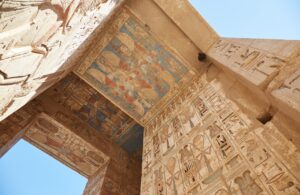
An Introduction to Ancient Egyptian Temples
Built over the course of thousands of years in dedication to a diverse and complex pantheon, the ancient Egyptian temple is a hard thing to pin down. But one thing remained constant: more than just elaborate stone constructions, the Egyptians always perceived their temples as something organic, or even alive. Thanks to their impeccable craftsmanship,
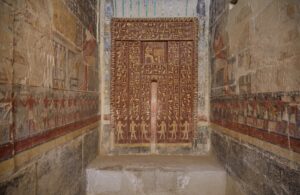
An Introduction to Ancient Egyptian Tombs
There are dozens of tombs to visit in Egypt, with countless more off-limits to the public. With their colorful artwork and interesting statues, ancient Egyptian tombs are a highlight for many visitors to the land of the pharaohs. But many can’t help but wonder: What do the scenes on the walls really mean? And why did

A Night in the White Desert
Egyptian civilization is responsible for many of the world’s greatest stone sculptures. But deep in the remote White Desert, some 500 km west of Cairo, stand hundreds of unique sculptures shaped by nature itself. Just nearby, meanwhile, are the aptly-named Black Desert and Crystal Mountain. Leaving my Cairo hotel just after six in the morning,

A Day in Islamic Cairo
No visit to Cairo is complete without a walk through Islamic Cairo, the medieval city established by the Fatimids in the 10th century. As you stroll down the district’s narrow alleyways, you’ll encounter monuments spanning the course of 1,000 years. Meanwhile, all around you, local residents will be going about their daily lives. For a major

Street Art: Aswan
In many big cities throughout the world, public murals are seen as a way of beautifying dull and gray concrete jungles. But in southern Egypt’s Aswan, the colorful murals mesh beautifully with the region’s natural surroundings. Street art, in fact, has long been a part of traditional Nubian culture. In the following guide to Aswan street
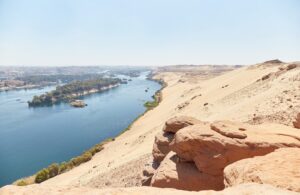
Top 5 Things to Do in Aswan
Aswan’s main attractions might not be able to compete with those of Luxor or Cairo. But that’s not to say the city has little to see. While many use Aswan as a base from which to visit Abu Simbel, the friendly and laidback city is worth an extended stay. In addition to scenic boat rides,
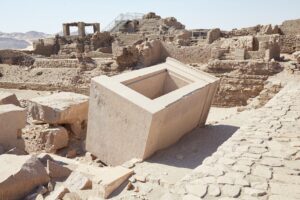
Elephantine & Seheil: Island Archaeology in Aswan
Within easy reach from central Aswan are two Nile River islands that Egyptian history lovers shouldn’t miss. Elephantine Island was always of special importance to Egyptian civilization, as it’s from where the god Khnum was said to control the flow of the whole Nile. Today, the Elephantine Island archaeological site contains ruins spanning from the
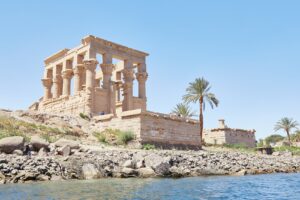
The Island Temples of Philae & New Kalabsha
The region of Nubia was home to some of ancient Egypt’s most scenic temples. Philae, a Greco-Roman temple dedicated to Isis, isn’t just remarkable for its stunning island location, but also for its history. Philae Island, in fact, was the very last holdout of the ancient Egyptian religion. While Philae remains one of Aswan’s most
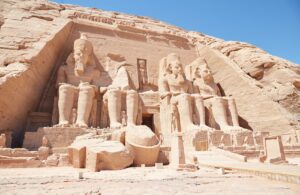
The Amazing Rock-Cut Temples of Abu Simbel
During his 67-year reign, Ramesses II completed more construction projects than any other pharaoh in history. But the rock-cut Abu Simbel stands out from all the rest. One can’t help but feel tiny when standing in front of its massive facade, while the isolated location adds to its mystique. It was certainly an ambitious project
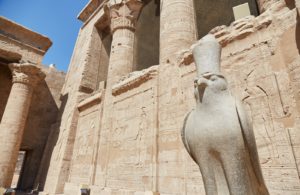
Edfu & Kom Ombo: The Falcon & The Crocodile
The temples of Edfu and Kom Ombo, both dating back to the Ptolemaic period, are the two most popular landmarks in between Luxor and Aswan. Edfu is widely regarded as Egypt’s very best-preserved temple, and it was intimately tied with the important Horus myth. Kom Ombo, meanwhile, is a laidback riverside temple dedicated to the
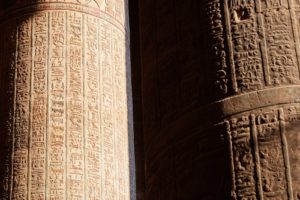
Esna & El Kab: On the Road to Aswan
While Aswan is just a few hours from Luxor by rail, the land between the two cities is home to a myriad of ancient wonders. During my travels, I opted for the slow route, arranging for a driver to make several stops along the way – the first two of which were Esna and El
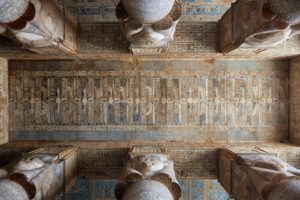
Dendera: The Temple of Hathor
Widely regarded as one of Egypt’s most beautiful and best-preserved temples, Dendera was established during the Greco-Roman era. But construction was taking place at the spot since at least the Old Kingdom. An inscription on-site, meanwhile, states that the temple plans date from a far older era, when Egypt was ruled by semi-divine beings known

Abydos: The Abode of Osiris
Abydos is perhaps Egypt’s most ancient necropolis, having been used for important burials since Predynastic times. The city was a popular pilgrimage spot for thousands of years, and pharaohs from all eras of Egyptian history constructed tombs and temples here. In fact, it was believed to be the resting place of the Lord of the Underworld himself,
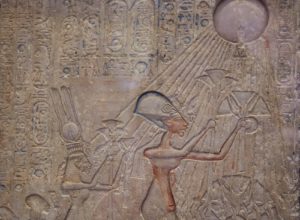
Shadowing the Aten: Hunting for Amarna Art Across Egypt
Egyptian civilization persisted for thousands of years with its art and religion remaining largely unchanged. That is, except for one brief 17-year period in the 14th century BC. Had Pharaoh Akhenaten merely moved the capital and changed some religious rites, perhaps his reign would be little more than a minor footnote in the annals of
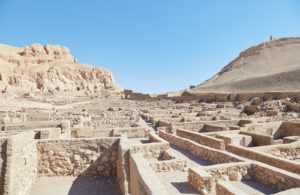
Touring the Non-Royal Tombs of Luxor
Luxor (or Thebes) was the religious capital of Egypt throughout the entire New Kingdom period. Accordingly, this is where most of the important nobles’ tombs from the era can be found. And many of them still retain their vibrant color today. Even if you’ve spent considerable time at places like Saqqara, the tombs of Luxor
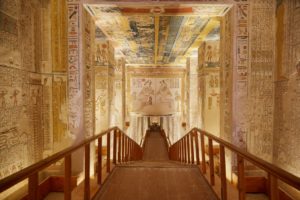
A Complete Guide to The Valley of the Kings (and Queens)
The Valley of the Kings, in use for around 500 years, is where most rulers of Egypt’s New Kingdom era were buried. The tombs were carved into the limestone hill of Al-Qurn in Luxor’s west bank, which curiously resembles a pyramid. And they provide us with invaluable insight into the Egyptians’ perception of the soul’s
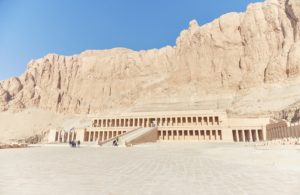
Touring the Temples of Luxor’s West Bank
In ancient Egypt, the west side of the Nile River was synonymous with the setting sun, completion and death. That’s why, in addition to the tombs themselves, numerous pharaohs built elaborate temples here to sustain their spirit. While the Mortuary Temple of Hatshepsut is undoubtedly the main highlight, there are some other gems, like Medinet
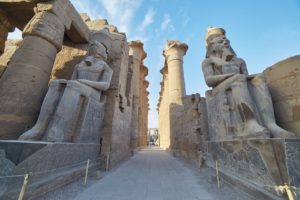
Luxor Temple: The Temple of Man
In ancient Egypt, the temple was much more than a place of worship. Each one could be likened to a multidimensional book with a focus on a particular teaching. This interpretation was developed by French researcher R.A. Schwaller de Lubicz who spent nearly two decades at Luxor Temple, taking measurements and examining the reliefs. From

A Guide to Karnak: Egypt’s Largest Temple
Karnak, the largest temple ever built by the ancient Egyptians, was in constant use for over 1,500 years. It was in a perpetual state of construction, which is quite fitting, as Karnak Temple was consecrated to creation itself. Accordingly, the complex is massive, and finding your way around can be confusing. This following Karnak Temple

Mazes and Mudbrick: The Pyramids of El Lahun & Hawara
The Middle Kingdom pyramids of El Lahun and Hawara aren’t on most travelers’ radars. In fact, the whole Middle Kingdom period (1975-1640 BC) itself often gets largely ignored. The era hasn’t left us with much that can compete with the Old Kingdom pyramids or with the New Kingdom temples of Luxor. Be that as it
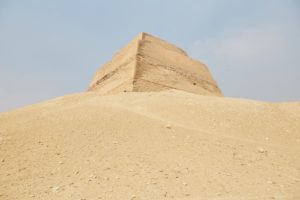
The Mysteries of Meidum & Mastaba 17
The lost pyramid of Meidum is well off the beaten path for most tourists. And as it appears today, it hardly even resembles a pyramid at all. But this was possibly Egypt’s first-ever smooth-sided pyramid. Exactly how it collapsed and when remains an unsolved puzzle, however. Just next to it, meanwhile, is the even more
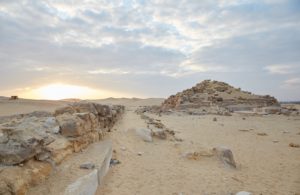
Abu Gorab: Sunset at Nyussere’s Sun Temple
About a kilometer across the desert from Abu Sir lies Abu Gorab, home to a Sun Temple erected by 5th Dynasty pharaoh Nyussere. While not in the greatest condition, it’s nevertheless one of the Old Kingdom’s best-preserved temples. At first glance, Nyussere’s Sun Temple may not look like much. But the temple is host to
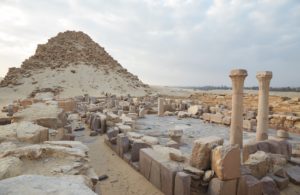
Visiting the Forgotten Pyramids of Abu Sir
The pyramid field of Abu Sir is situated in the desert between Giza and Saqqara, right next to the modern village of the same name. The Abu Sir pyramids are synonymous with the 5th Dynasty – a group of rulers who tried, but couldn’t quite recapture the splendor of their predecessors. Be that as it
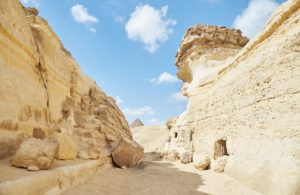
5 Hidden Gems of Giza: A Second Sphinx?
The Giza Plateau, home to Egypt’s largest pyramids and the Sphinx, needs little introduction. But few visitors are aware of just how much else there is to see beyond the main highlights. While exploring the pyramids should be your top priority, consider coming back for a second visit. Walking around the plateau, you can find
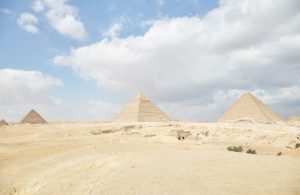
Giza: The Mysteries of The Pyramids & The Sphinx
So many aspects of the Giza Plateau are shrouded in mystery. The 4th Dynasty pyramids represent the apex of Egyptian engineering. But they were built quite early on in Egypt’s history. For the next few thousand years, no successive Egyptian dynasty would ever be able to match them. The question of how the 4th Dynasty Egyptians
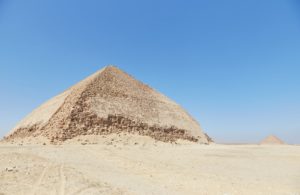
Dahshur & Memphis: Entering the Bent Pyramid of Sneferu
In between Djoser’s Step Pyramid and the Great Pyramid of Giza, a king named Sneferu made a name for himself as Egypt’s greatest ever pyramid builder. Snefuru, who took the throne in 2575 BC, is credited with two large pyramids at Dahshur, a site just south of Saqqara. One of them is the Red Pyramid,
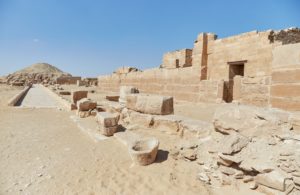
Saqqara: The Ultimate Guide
Saqqara is, without a doubt, one of the most fascinating and important archaeological sites on the entire planet. But being just a short drive away from the Giza Plateau – arguably the world’s most famous attraction – means that it doesn’t quite get the attention it deserves. Though many visit Saqqara as part of a half-day
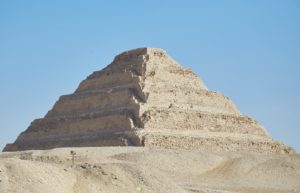
Stepping Inside the Step Pyramid of Djoser
It’s widely regarded as the world’s very first pyramid. And, for that matter, the first-ever major stone structure. And now, over 4600 years after its construction, Saqqara’s Step Pyramid continues to make headlines. For the first time in 14 years, the subterranean labyrinth beneath the pyramid has just opened up to the general public. Having
